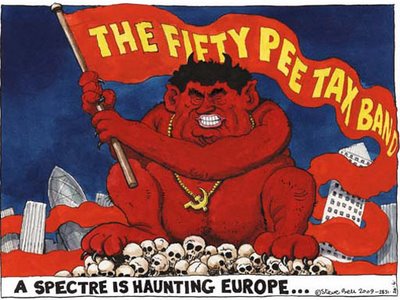One of the things that newspapers specialise in is kicking people when they're down, usually after they were the ones that were primarily responsible for building them up in the first place. A recent case in point was the sudden deflating of James Corden and Mathew Horne, having been ridiculously over praised for the middling Gavin and Stacey, who were little less than assaulted over their film, Lesbian Vampire Killers, their piss-poor eponymous BBC3 sketch show, and a charity appearance which was deemed to be little better.
More pertinently politics wise is the way that Damian McBride has been set about since the "smeargate" emails emerged of him batting about ideas for a blog in which Tories had their private and personal lives appraised for gossip value. The latest example is in today's Graun, where McBride is linked to an "infamous incident" back in 2004, so infamous that this self-confessed politics nerd has no recollection whatsoever of it. More astonishing than the fact that McBride was fingered as the person responsible for leaking details of the meeting to the Sunday Times is that a "secret investigation" was launched in which phone records and presumably security assets were used to find the culprit. It says more about Downing Street's paranoia and fury at the slightest criticism at the time than it does about how much of a "wrong 'un" McBride always was.
Peter Wilby pointed out yesterday that prior to the last two weeks McBride had hardly been mentioned in the papers, his existence and apparently his dark arts of no interest to anyone when both sides were profiting from his dripping of poison. In 2004 the Graun mentioned McBride but once - and that was in a City diary. Even last year, at the apparent height of McBride's operations, he was only mentioned in dispatches 34 times, and 5 of those were in the little read online lobby column by "Bill Blanko", the rest mainly coming from reports concerning the defenestration of Ruth Kelly. As spin doctors go, you can hardly get more visible than Alastair Campbell, while it seems you can hardly get less visible than McBride was. Only once he had fallen on his sword did we learn about his work in the shadows, mainly briefing Tory newspapers, the ones so outraged by the smears which would never have emerged and seemingly never have been used if someone hadn't hacked Derek Draper's email account, with venom about under performing ministers. Almost every whisper about plotting by various pretenders to Brown's throne seems to have originated with McBride - either that or he's just a handy receptacle to now blame.
There is something in the argument made by various bloggers that the journalistic lobby at Westminster, because it is complicit in the spinning, cannot be trusted to tell us the whole truth about what goes on there. At the same time, the idea that blogs can be trusted to do just that is equally spurious, if not more so. However much bloggers denounce the MSM, the two are inseparable because they cannot operate without each other. Guido had to sell the emails to Sunday newspapers because they would have not gained the same coverage that they would have on his site, however much he and Iain Dale boast about their visitor figures. Gossip is well suited to the web because it requires few resources: just a few indiscreet individuals. Genuine investigative journalism however, such as that which brought down Jonathan Aitken, or more recently exposed the rendition programme or the Saudi slush funds needs constant backing up and funding. Even when it comes to videos which expose the truth, such as the one showing Ian Tomlinson being pushed over by a police officer, it requires the reach of a paper like the Guardian for it to truly spread quickly: if it had simply been sent up to YouTube or a blog like the dozens of others of the G20 protests, it would have taken days for it to reach critical mass.
Perhaps the biggest reason for the pique and faux outrage which followed McBride's resignation then is that it wasn't a blast against the spin culture, which after all cannot operate without the media's connivance, even as they decry it, but rather because one of their finest sources for muck had been forced outside of the circle. The motto was and remains, "don't get fucking caught". That applies to journalists and spin doctors equally.Labels: bloggocks, Conservatives, Damian McBride, Derek Draper, fall of Gordon Brown, Gordon Brown, Guido, Paul Staines, politics, smearing, spin



